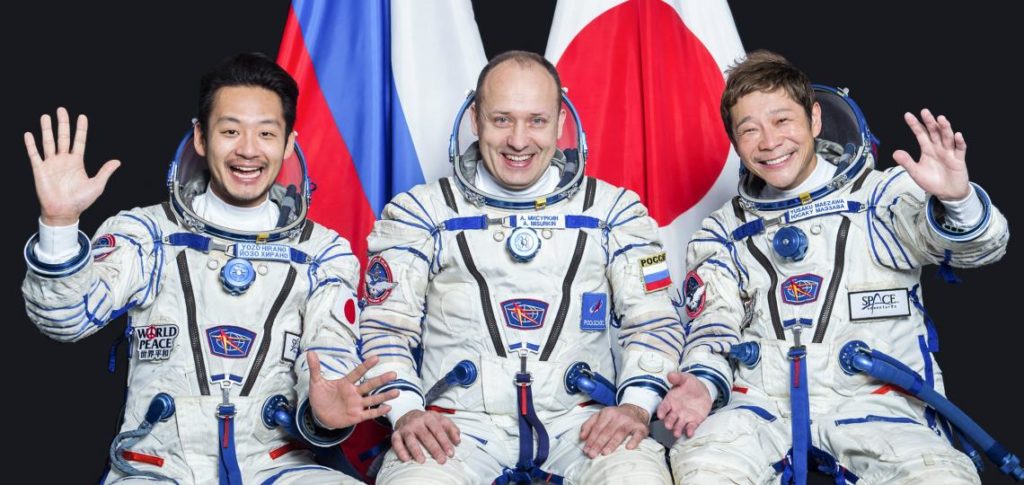
Yozo Hirano (L), Alexander Misurkin (C) and Yusaku Maezawa (R) will be traveling to the International Space Station arranged by Space Adventures in partnership with Roscosmos. (Photo/Roscosmos)
Handheld autorefractor to be used in Translational Research Institute for Space Health (TRISH) research
Cambridge, Massachusetts, November 29 – PlenOptika, Inc., creator of QuickSee™, the world’s most accurate handheld autorefractor, announced today it is participating in research to understand the impact of spaceflight on vision as part of the Translational Research Institute for Space Health’s (TRISH) research complement. QuickSee will be used to measure refractive error of a private visitor to the International Space Station (ISS) prior to departure next week and upon return 12 days later.
“We are excited to join this research to understand the impact of spaceflight on vision,” said Shivang Dave, PhD, CEO and Co-founder of PlenOptika. “It’s humbling and profoundly motivating to be part of the more than 60-year tradition of space medicine driving technology innovation that benefits the billions of people living on Earth.”
QuickSee will be used to measure the pre- and post-flight visual acuity of Yozo Hirano, a Japanese citizen who will travel with Yusaku Maezawa to the ISS on a 12-day mission by arrangement with Space Adventures, Inc. They will travel on the Soyuz MS-20 commanded by Russian cosmonaut Alexander Misurkin from Baikonur Cosmodrome in Kazakhstan on Dec. 8, 2021. Their experience in space will be shared on Maezawa’s YouTube channel.
The vision testing is part of TRISH’s EXPAND (Enhancing eXploration Platforms and ANalog Definition) program, which collects pre-flight, in-flight, and post-flight health data to increase human health and performance research on commercial spaceflights. TRISH is a virtual institute empowered by NASA’s Human Research Program to find and fund innovative solutions the challenges of human deep space exploration. Meeting TRISH’s rigorous requirements for accuracy and usability in demanding conditions, QuickSee is the only autorefractor selected for the mission. Mr Hirano’s participation in testing is expected to help understand the health impacts of spaceflight for the benefit of future explorers.
“PlenOptika’s QuickSee will provide valuable information about the effects of spaceflight on vision and will inform on the most important risks to human health in low earth orbit,” said Dorit Donoviel, PhD, TRISH executive director. “We are excited to have PlenOptika join TRISH’s EXPAND program and we are eager to see the results from this mission.”
QuickSee is an essential tool to address the challenge of uncorrected refractive error, a matter of major global concern, including wealthy nations. Poor vision tremendously impacts quality of life, education, and workforce opportunities. A report published by The Lancet in February 2021 estimated that over 1 billion people worldwide had distance-or near-vision impairment, resulting in at least $410 billion in productivity loss annually.
About PlenOptika
PlenOptika designs and produces tools to help vision professionals perform their best care anywhere. Inspired to solve the global burden of poor vision, we developed QuickSee™, the world’s most accurate handheld autorefractor. Vision professionals and NGOs have used QuickSee on over 3 million patients in more than 45 countries to transform their lives with clear vision.
About the Translational Research Institute for Space Health (TRISH)
Led by Baylor College of Medicine’s Center for Space Medicine, TRISH is a consortium that includes partners Caltech and MIT. NASA recently awarded the institute a six-year extension to further its work by delivering disruptive solutions to mitigate biomedical risks for human exploration while advancing terrestrial health technologies. Learn more about TRISH at bcm.edu/spacehealth and follow the Institute on Facebook, Twitter and Instagram (@BCMSpaceHealth).
Are you ready to learn how to use QuickSee Free / Free Pro effectively? Tell us about yourself and your circumstances and we will reach out to arrange a training session with you.